8+ Sample Financial Meeting Minutes
-
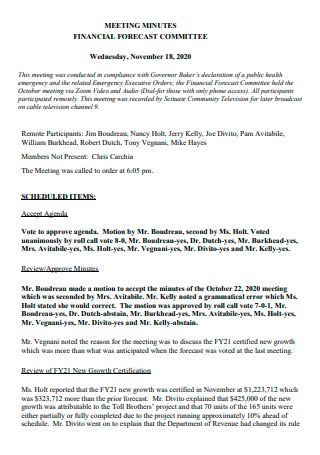
Financial Forecast Committee Meeting Minutes
download now -
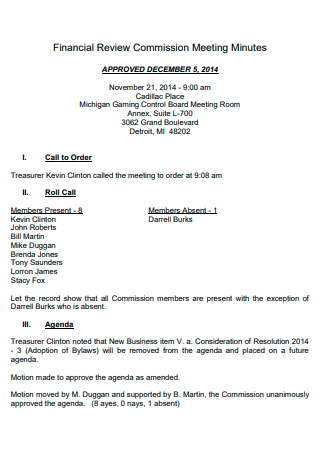
Financial Review Commission Meeting Minutes
download now -
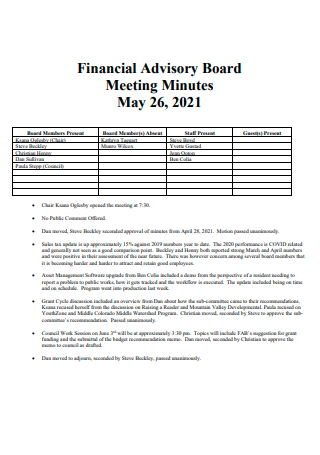
Financial Advisory Board Meeting Minutes
download now -
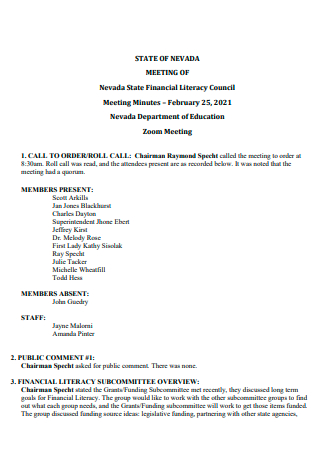
Financial Literacy Council Meeting Minutes
download now -
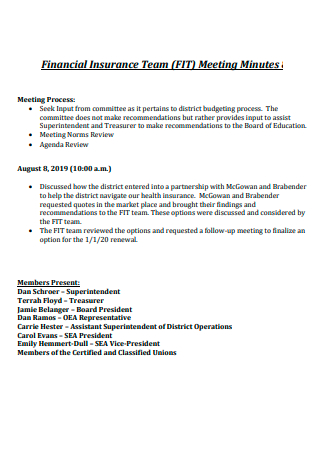
Financial Insurance Team Meeting Minutes
download now -
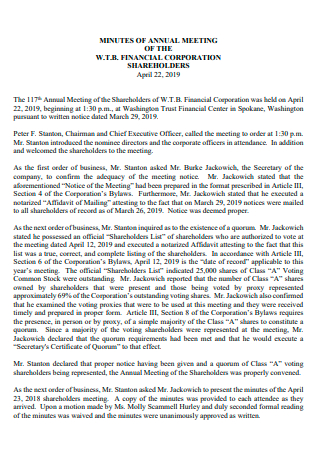
Financial Corporation Shareholders Annual Meeting Minutes
download now -
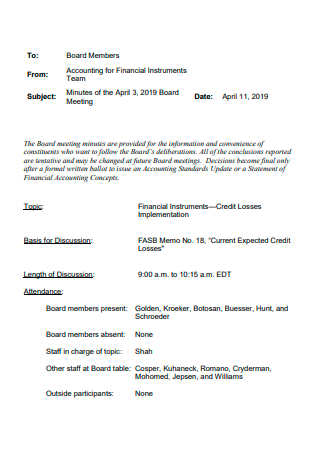
Accounting For Financial Instruments Board Meeting Minutes
download now -
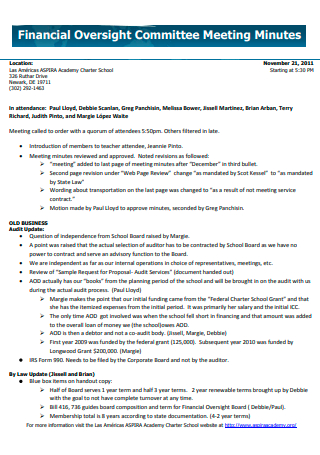
Financial Oversight Committee Meeting Minutes
download now -
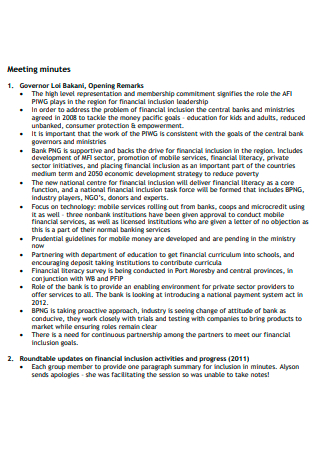
Financial Meeting Minutes in PDF
download now
FREE Financial Meeting Minutes s to Download
8+ Sample Financial Meeting Minutes
What Are Financial Meeting Minutes?
What Topics Are Covered in a Financial Meeting?
Elements of an Effective Finance Meeting
How to Write an Effective Finance Meeting Minutes
FAQs
How long should a Finance Meeting last?
Do meeting minutes need to be approved or signed?
What is the difference between Formal and Informal Meetings?
What Are Financial Meeting Minutes?
In order to get acquainted with what the minutes of a financial meeting are, it is important for us to understand what is a financial meeting first. A financial meeting is held by the finance department along with employees with the purpose of discussing problems or concerns that relate to the financial side of the company and developing the necessary action plans to combat any potential problems that have been discussed during the said meeting. A finance meeting also serves as a good starting point to ensure that a business is still on track. A financial meeting also allows the department to assess in a rational way where they currently stand in terms of their finances to determine if any financial goals have changed and to decide on what things to do to achieve the goals that are set.
A financial meeting minutes document is a legal paper or note that highlights the key issues that were discussed during the meeting, the motions that were proposed or voted on, and the activities to be undertaken to address any issues. This document is usually taken by the secretary or a designated participant of the meeting.
What Topics Are Covered in a Financial Meeting?
It is a good idea to gather around, sit down, and discuss with your finance department in a regular period (preferably at the end of every month) your financial statements and perform a financial review. Here are the common topics that are covered whenever a financial meeting takes place:
Elements of an Effective Finance Meeting
Here are some of the common steps or elements that make an effective finance meeting. This may also apply to other meetings.
How to Write an Effective Finance Meeting Minutes
Meeting minutes are a clean and concise way of taking notes and it helps keep track of essential information. When written effectively, a finance meeting minutes document can serve as a critical communications tool for your business. With that being said, here are the steps in creating an effective finance meeting minutes:
1. Identify what things should be written.
It is important for the secretary or the meeting’s designated notetaker to identify what to write. In this step, note the company name, date, and time at the top of the document. Also, include any other kinds of relevant information, such as a specific department, or a team name, or any other reason on why the finance meeting was called.
2. Record the attendees.
The board chairman, board members, and staff who are directly involved with the company’s financials such as the accountant or finance manager, are the ones who are normally present at a finance meeting. If it is a government finance meeting, the mayor may even be present. If there is to be a discussion regarding a specific project, the outside companies may even be represented at the meeting. Make a mental note of everyone’s respective titles. If necessary, distribute an attendance sheet to ensure that the exact names of the attendees are recorded. You can also make a list of attendees who are unable to attend the finance meeting but could require a copy of the minutes.
3. Be a good listener.
It is also crucial to understand when the secretary or the designated notetaker should simply listen to the person who is presenting an agenda in front. Once he/she is certain what to write down in the minutes, the best option is to simply listen and focus on the topic being discussed by the speaker. The finest minute takes are also frequently excellent listeners. It also ensures that the meeting goes off without a hitch and with few or no interruptions. As a result, there is a possibility that all the agendas of the financial meeting will be properly covered.
4. Record the topics.
Keep track of your notes as each agenda is being discussed. Budgets, specific project financials, income or financial statements, future allocations, and adjustments made or updates to the budget calendar are among the topics that are frequently discussed at a finance meeting. Depending on the company protocols, provide primary topics of discussion and subpoints in prose or bullet style. Take note of who is speaking, any numbers or names stated, as well as anyone to whom a task has been assigned and that particular task’s due date.
5. Record the other businesses that were discussed during the meeting.
Create a new section and label it “Other Businesses” once the items on the agenda have been discussed. Here, you should keep track of any new topics that come up for discussion in this section. As with recording the main topics, note down the speaker’s name, any dates or numbers mentioned, as well as any assigned topics and their due dates.
6. Proofread and address any missing information.
In this step, make sure that your meeting notes are readable and grammatically correct, that there are no mistakes, and that the names of the attendees with their titles (if necessary) are written correctly before submitting them. If there is any missing information that you believe was mentioned, try to locate it. It is also important to try to write the minutes as quickly as possible after the meeting has adjourned since what was discussed during the meeting is still fresh and can be easily remembered.
FAQs
How long should a Finance Meeting last?
The length of a finance meeting depends on the agenda of the said meeting. Since a finance meeting is typically held at the end of every month, expect it to be lengthy, around 60 to 90 minutes. Should you find that the finance meeting lasts more than 100 minutes already, you should communicate about a possible revision of the meeting agenda to remove some topics that warrant an entirely different discussion. More long-term issues affecting the company or entirely different concerns may be forwarded to an entirely different discussion.
Do meeting minutes need to be approved or signed?
In order to be an official record of the meeting, certain meeting minutes need to be validated in some way. Before the minutes may be circulated, the chairman usually has to review and approve them. Alternatively, minutes are reviewed and approved by the group at the start of the next meeting in many organizations. Apart from these circumstances, whether or not your minutes are approved is up to the executives of the organization and how they choose to operate their respective procedures.
What is the difference between Formal and Informal Meetings?
Formal meetings are to be attended by people who hold defined roles, who are likely to be a part of a company or organization hierarchy, such as the company secretary, chief executive officer, or the company chairman. The procedures that usually take place at a formal meeting are governed by pre-defined policies. There will always be an agenda and supporting documents for distribution among the attendees. Additionally, minutes must also be always taken at formal meetings, which are presented in a recognized and structured style using formal language.
When it comes to informal meetings, the majority of day-to-day meetings that are organized by businesses usually fall into this classification. These can include staff catch-ups, brainstorming sessions, and any form of progress updates. Although minutes are not legally required at an informal meeting, it is always a good idea to take notes even if it’s just a case of writing down action points for distribution among the attendees.
The finance department of a company should be able to make the right decisions at each stage of the company’s growth to ensure its profitability, longevity, and success. Holding regular financial meetings enables a company or a business to have these discussions. Finance meeting minutes have to be especially detailed and specific as they deal with important numbers and statistics. Effective finance meeting minutes can state the approaches that were proposed in order to solve a particular problem and why members have opted for one option over the other. The person-in-charge with writing down the finance meeting minutes should know that the minutes to be written down should be following the respective company protocol and adhere to the company’s basic guidelines of taking down effective and efficient meeting minutes. In this article, examples of an efficient and effective finance meeting minutes are posted for use as a reference in case you need to make one.
